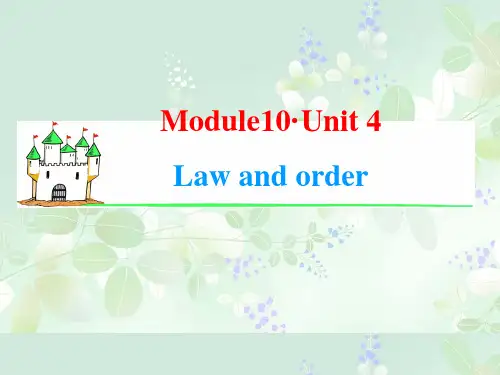【学海导航】2015届·新课标高中英语一轮总复习课件M8Unit 3The world of colours and light(共45张PPT)
- 格式:pdf
- 大小:634.58 KB
- 文档页数:45
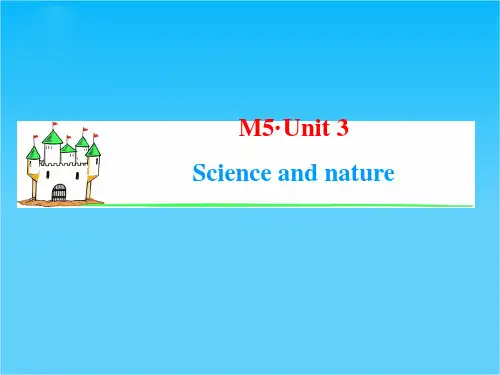
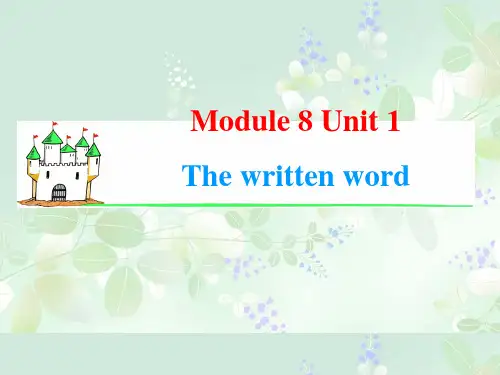

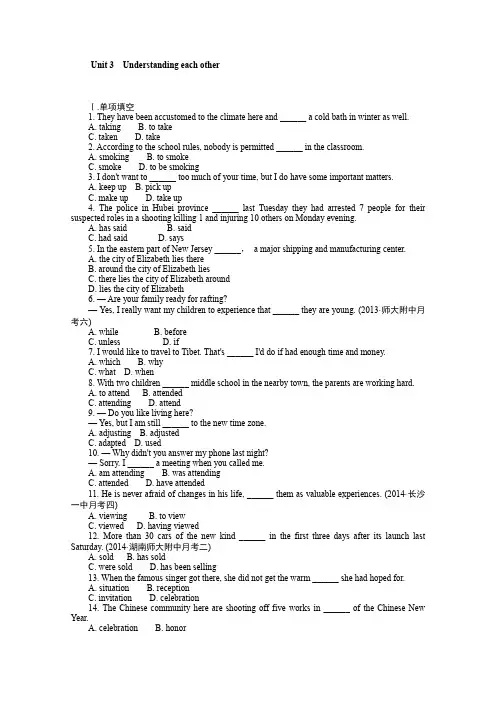
Unit 3Understanding each otherⅠ.单项填空1. They have been accustomed to the climate here and ______ a cold bath in winter as well.A. takingB. to takeC. takenD. take2. According to the school rules, nobody is permitted ______ in the classroom.A. smokingB. to smokeC. smokeD. to be smoking3. I don't want to ______ too much of your time, but I do have some important matters.A. keep upB. pick upC. make upD. take up4. The police in Hubei province ______ last Tuesday they had arrested 7 people for their suspected roles in a shooting killing 1 and injuring 10 others on Monday evening.A. has saidB. saidC. had saidD. says5. In the eastern part of New Jersey ______,a major shipping and manufacturing center.A. the city of Elizabeth lies thereB. around the city of Elizabeth liesC. there lies the city of Elizabeth aroundD. lies the city of Elizabeth6. — Are your family ready for rafting?— Yes, I really want my children to experience that ______ they are young. (2013·师大附中月考六)A. whileB. beforeC. unlessD. if7. I would like to travel to Tibet. That's ______ I'd do if had enough time and money.A. whichB. whyC. whatD. when8. With two children ______ middle school in the nearby town, the parents are working hard.A. to attendB. attendedC. attendingD. attend9. — Do you like living here?— Yes, but I am still ______ to the new time zone.A. adjustingB. adjustedC. adaptedD. used10. — Why didn't you answer my phone last night?— Sorry. I ______ a meeting when you called me.A. am attendingB. was attendingC. attendedD. have attended11. He is never afraid of changes in his life, ______ them as valuable experiences. (2014·长沙一中月考四)A. viewingB. to viewC. viewedD. having viewed12. More than 30 cars of the new kind ______ in the first three days after its launch last Saturday. (2014·湖南师大附中月考二)A. soldB. has soldC. were soldD. has been selling13. When the famous singer got there, she did not get the warm ______ she had hoped for.A. situationB. receptionC. invitationD. celebration14. The Chinese community here are shooting off five works in ______ of the Chinese New Year.A. celebrationB. honorC. memoryD. consideration15. It would have make a lot of ______ if you had told me about it two days earlier.A. effortB. differenceC. outcomeD. resultⅡ.完形填空A(2013·全国新课标卷改编) Michael Greenberg is a very popular New Yorker. He is not famous in sports or the arts. But people in the streets __1__ him, especially those who are poor.For those people, he is “Gloves” Greenberg. How did he get that __2__?He looks like any other businessman, wearing a suit and carrying a briefcase (公文箱). But he's __3__. His briefcase always has some gloves.In winter, Mr. Greenberg does not act like other New Yorkers, who look at the sidewalk and hurry down the street. He looks around at __4__. He stops when he __5__ someone with no gloves. He gives them a pair and then he moves on, looking for more people with cold __6__.On winter days, Mr. Greenberg __7__ gloves. During the rest of the year, he buys gloves. People who have heard about him __8__ him gloves, and he has many in his apartment.Mr. Greenberg __9__ doing this 21 years ago. Now, many poor New Yorkers know him and __10__ his behavior. But people who don't know him are sometimes surprised by him. They don't realize that he just wants to make them happy.It runs in the __11__. Michael's father always helped the poor as he believed it made everyone happier. Michael Greenberg feels the same. A pair of gloves may be a __12__ thing, but it can makea big difference in winter.1. A. know about B. learn fromC. cheer forD. look for2. A. job B. nameC. chanceD. message3. A. calm B. differentC. crazyD. curious4. A. cars B. peopleC. street numbersD. traffic lights5. A. helps B. choosesC. greetsD. sees6. A. hands B. earsC. facesD. eyes7. A. searches for B. stores upC. gives awayD. puts on8. A. call B. sendC. lendD. show9. A. delayed B. rememberedC. beganD. enjoyed10. A. understand B. dislikeC. studyD. excuse11. A. city B. familyC. neighborhoodD. company12. A. small B. usefulC. delightfulD. comfortingB(原创)I have often found it interesting talking to foreigners and learning about the cultural differences between countries. I think 1.__________ is important to know about the customs and traditions of different countries in order to avoid misunderstanding.Last Saturday, I met a man from France, 2.__________ explained to me how the French greet each other. Now I know the French usually shake hands when they meet. If they know each other very well, they kiss each other 3.__________ the cheek. They shake hands again when they are saying goodbye. It isn't unusual for a French person who you met several minutes ago to come and shake hands with 4.__________ again! This is just one of the many French traditions. If you went to live in France, you might find it hard to adjust 5.__________ their ways.Almost every culture in the world has its own taboos, and it is important to be aware of them.Breaking a taboo could be 6.__________ experience that will upset those around you. For example, in Japan, “4” and “9” are considered to be numbers that are unlucky, 7.__________ the Japanese words for these two numbers sound like “death” and “suffering”. It would be important to know this if you 8.__________ like to visit Japan on holiday.Ⅲ.阅读理解(2013·江西) The light from the campfire brightened the darkness, but it could not prevent the damp cold of Dennis's Swamp (沼泽地) creeping into their bones. It was a strange place. Martin and Tom wished that they had not accepted Jack's dare. They liked camping, but not near this swamp.“So,”Martin asked as they sat watching the hot coals. “How did this place get its name?”“Are you sure you want to hear it? It's a scary story,” warned Jack.“Of course!” cried out Tom. “If there were anything to be scared of, you wouldn't have chosen this place!”“OK, but don't say I didn't warn you,” said Jack, and he began this tale.Way back in time, a man called Dennis tried to start a farm here. He built that cottage over there to live in. In those days, the area looked quite different —it was covered with tall trees and the swamp was a crystal-clear river. After three hard years, Dennis had cleared several fields and planted crops. He was so proud of his success that he refused to listen to advice.You are clearing too much land, warned one old man. The land is a living thing. It will hit back at you if you abuse it.Silly fool, said Dennis to himself. If I clear more land, I can grow more crops. I'll become wealthier. He's just jealous!“De nnis continued to chop down trees. Small animals that relied on them for food and shelter were destroyed. He was so eager to expand his farm that he did not notice the river flowing slowly towards his door. He did not notice salt seeping to the surface of the land. He did not notice swamp plants choking all the native plants.”“What happened?”Martin asked. It was growing colder. He trembled, twisting his body closer to the fire.“The land hit back — just as the old man warned,”Jack shrugged. “Dennis disap peared. Old folks around here believe that swamp plants moved up from the river and dragged him underwater. His body was never found.”“What a stupid story,” laughed Tom. “Plants can't…” Before he had finished speaking, he screamed and fainted (晕倒). The other two boys jumped up with fright, staring at Tom. Suddenly, they burst out laughing. Some green swamp ivy (常春藤) had covered Tom's face. It was a while before Tom could appreciate the joke.1. The underlined word “dare” in Paragraph 1 is closest in mean ing to ______.A. courageB. assistanceC. instructionD. challenge2. Why did Jack tell Tom and Martin the story?A. To frighten them.B. To satisfy their curiosity.C. To warn them of the danger of the place.D. To persuade them to camp in the swamp.3. Why did Dennis ignore the warning of the old man?A. The old man envied him.B. The old man was foolish.C. He was too busy to listen to others.D. He was greedy for more crops.4. Why did Tom scream and faint?A. He saw Dennis's shadow.B. He was scared by a plant.C. His friends played a joke on him.D. The weather became extremely cold.5. What lesson can we learn from the story of Dennis?A. Grasp all, lose all.B. No sweat, no sweet.C. It is no use crying over spilt milk.D. He who makes no mistakes makes nothing.Ⅳ.阅读简答(2014·雅礼高三月考一) David Jones is probably not somebody you want to hang out with. Not because he isn't a cool person, but because he is living with 40 deadly snakes.Jones is living in a room for 121 days with more than three dozen constrictors, green mambas, boomslangs and other deadly snakes in an attempt to set a Guinness world record. The record for most days spent confined to a room with this particular number of snakes is 113, set by Martin Smith in 2008.“I am hoping people will realize that we can live with these fantastic creatures without fearing and killing them. People come and see me here and are constantly amazed at how I am interact with these animals. The snakes are not restrained in any way and make the full use of the entire room including my bed, shower and toilet,” Jones explains. They mainly hide out in cupboards or on the various makeshift (临时的)branches or bushes that Jones has in their shared quarters. Once a week, someone brings captured mice and rats to offer as a sacrifice to the snakes.David Jones is forced to move the snakes with a “hook stick” throughout the day, so that he can do things like sitting at his desk or typing on his laptop, his only means of contacting the outside world.The snakes often drop on his pillow or shoulders as he's trying to work or sleep, but there have so far been no instances of Jones being bitten by one of these deadly snakes. He said, “if I give them respect, we can live together happily.”Jones is doing this for charity. All the money raised will go to a hospice(收容所) in his hometown of Crawley, near London.1. What are constrictors, mambas and boomslangs? (No more than 5 words)________________________________________________________________________2. How is David Jones staying in touch with other people? (No more than 5 words)________________________________________________________________________3. Why don't the snakes bite Jones? (No more than 6 words)________________________________________________________________________4. What are the purposes of David Jones's doing so? (No more than 15 words)________________________________________________________________________Unit 3Ⅰ.1. A考查固定搭配。
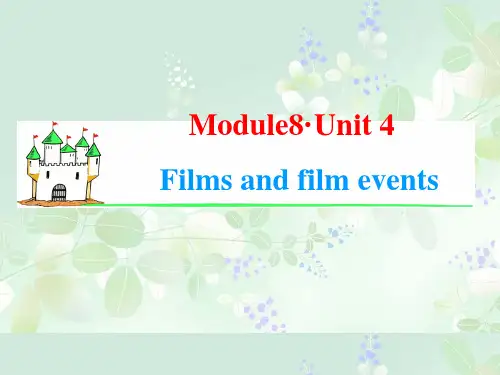
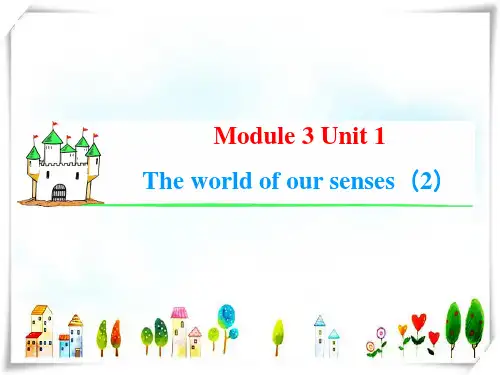
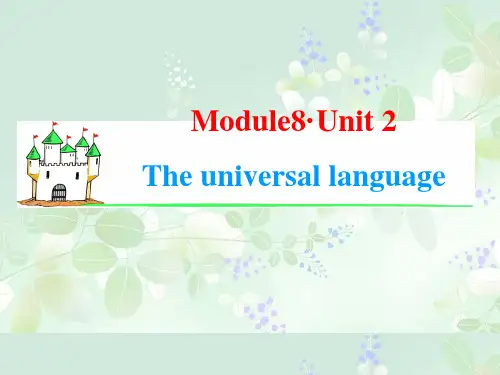
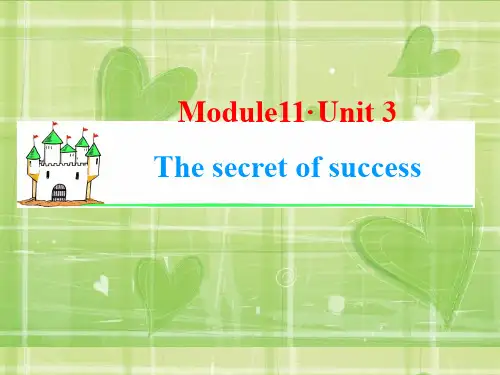
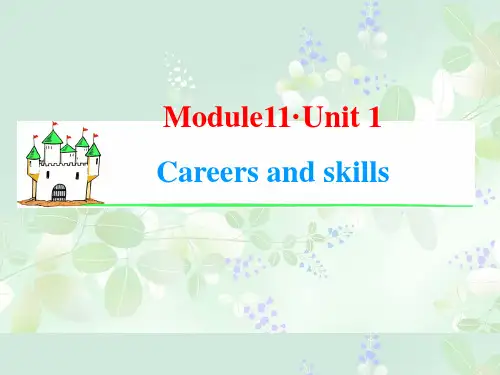
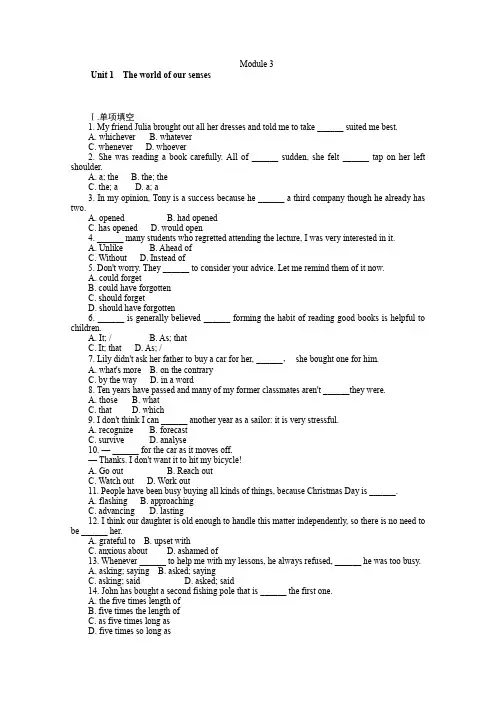
Module 3Unit 1The world of our sensesⅠ.单项填空1. My friend Julia brought out all her dresses and told me to take ______ suited me best.A. whicheverB. whateverC. wheneverD. whoever2. She was reading a book carefully. All of ______ sudden, she felt ______ tap on her left shoulder.A. a; theB. the; theC. the; aD. a; a3. In my opinion, Tony is a success because he ______ a third company though he already has two.A. openedB. had openedC. has openedD. would open4. ______ many students who regretted attending the lecture, I was very interested in it.A. UnlikeB. Ahead ofC. WithoutD. Instead of5. Don't worry. They ______ to consider your advice. Let me remind them of it now.A. could forgetB. could have forgottenC. should forgetD. should have forgotten6. ______ is generally believed ______ forming the habit of reading good books is helpful to children.A. It; /B. As; thatC. It; thatD. As; /7. Lily didn't ask her father to buy a car for her, ______,she bought one for him.A. what's moreB. on the contraryC. by the wayD. in a word8. Ten years have passed and many of my former classmates aren't ______they were.A. thoseB. whatC. thatD. which9. I don't think I can ______ another year as a sailor: it is very stressful.A. recognizeB. forecastC. surviveD. analyse10. — ______ for the car as it moves off.— Thanks. I don't want it to hit my bicycle!A. Go outB. Reach outC. Watch outD. Work out11. People have been busy buying all kinds of things, because Christmas Day is ______.A. flashingB. approachingC. advancingD. lasting12. I think our daughter is old enough to handle this matter independently, so there is no need to be ______ her.A. grateful toB. upset withC. anxious aboutD. ashamed of13. Whenever ______ to help me with my lessons, he always refused, ______ he was too busy.A. asking; sayingB. asked; sayingC. asking; saidD. asked; said14. John has bought a second fishing pole that is ______ the first one.A. the five times length ofB. five times the length ofC. as five times long asD. five times so long as15. ______ the students will visit the city museum this weekend hasn't been decided.A. WhetherB. ThatC. ifD. WhatⅡ.完形填空AHe is 60 percent disabled. Yet he is the only one in the world who makes a __1__ by scaling(攀登)buildings. He is Alain Robert.“He is __2__!” cried a passer-by while Robert, nicknamed “Spiderman”,was climbing up a skyscraper in Hong Kong.No harnesses(保险带), no helmet, there was only the __3__ Spiderman in his climbing shoes, climbing the 137-meter-high skyscraper, one step at a time. Police quickly __4__ the street as more and more people gathered to watch the scene, holding their __5__.Before police set up a huge buffering mattress(缓冲垫)down on the ground and moved into __6__ positions, Robert had already reached the top.In fact, anyone would be surprised to see Robert, a 1.65-meter-tall man, who was able to do this at all. The Frenchman has __7__ 85 giant buildings around the globe so far, including the Eiffel Tower in Paris and the Empire State Building in New York. Sometimes he carries a mission with him. Sometimes, he climbs just for __8__.“As a young boy I was __9__,afraid of heights and lacking confidence,” he said. His passion for climbing was set off quite by accident. He was locked outside his home one day when he was 11. Both of his parents were working. So the little boy had no __10__ but to climb up the building into his own house. Since that day, he has known that climbing is the only thing he's ever __11__ to do in life.Aren't you afraid? People always ask him. The man answers with a smile, “A lot of people are dreaming but they don't have the courage to make their dreams come __12__. At least I'm the one who did it. I'm not afraid of dying; I'm afraid of not living.”1. A. fortune B. promiseC. differenceD. living2. A. crazy B. tiredC. cleverD. creative3. A. bare-handed B. absent-mindedC. warm-heartedD. cold-blooded4. A. cleaned B. emptiedC. blockedD. searched5. A. hand B. beliefC. positionD. breath6. A. rescue B. observationC. fightD. photography7. A. designed B. exploredC. conqueredD. examined8. A. work B. defenceC. payD. fun9. A. adventurous B. shyC. braveD. rude10. A. idea B. timeC. rightD. choice11. A. hated B. intendedC. agreedD. pretended12. A. true B. aliveC. rightD. looseBLiu Wei was born in 1987 in Beijing. As a child, he liked sports and wanted to become a football player. In 1997, he lost 1.__________ his arms in an accident. At first, he was distraught(心烦意乱的) about his condition, 2.__________ he soon realized he had a choice to make. “For people like me, there were only two choices. One was to give up all dreams, 3.__________ would lead to a quick, hopeless death. The other was to struggle without arms to live 4.__________outstanding life,” said he. Fortunately, he chose the 5.__________. He managed to do everything with his feet in his everyday life. In 2006, he decided to become a pianist and started 6.__________ learn to play the piano with his toes. He spent over 8 hours every day in practicing playing the piano.7.__________ the end, his efforts paid 8.__________. In October, 2010, Liu Wei took part in China's Got Talent show. He won the show after performing You're Beautiful using only his toes. In February, 2012, he was elected one of Ten Top Touching China Figures.Ⅲ.阅读理解You don't know what you've got until it's gone. When I bake cookies, I immediately miss them the moment I have eaten the last one. Last summer when I left a summer camp, I didn't realize how great it really was until I got home. What happens, however, when that happens to one of your senses?A few months ago I woke up deaf in one ear. I did not pay much attention to it at first. It felt that I had water in my ear. However, I began to hear less and less out of that ear. I even had to ask people to talk into my other ear so I could hear them. I didn't realize how serious it was until later in the day. That evening, when I was sitting on my bed doing chemistry homework, I fell off my bed! When trying to get up, I was incredibly dizzy(头晕的).I went to see a doctor who told me that hearing loss was common. However, it was usually bilateral,_or occurs in both ears. He said that my hearing should come back within a week.After about a week the dizziness eventually went away, but the hearing loss did not. The medicine helped and I gained some of my hearing back. After many hearing tests, it was determined that I had permanent hearing loss in that ear.School became harder for me because I couldn't hear my teachers. I was very depressed.Finally, I bought a hearing aid. With the hearing aid, my hearing is almost back to normal! It makes school and group conversations easier.My friends, teachers, and even complete strangers always ask me questions about hearing loss.I answer them patiently. I never get offended because I know that this is new to them. I am delighted I can teach them something new.What I have learned from this particular situation is that when things are desperate, there is always something good that can come out of it. My experience has given me an opportunity to teach people about something new to them and it has taught me about the value of hearing.1. What do you know from the first paragraph?A. The author had a great time in the summer camp.B. The author didn't enjoy himself in the summer camp.C. The author lost the sense of hearing in the summer camp.D. The author baked delicious cookies in the summer camp.2. The author fell off his bed when ______.A. getting up from the bedB. doing his homeworkC. waking up from a dreamD. wearing his clothes3. The underlined word “bilateral” means ______.A. speaking two languagesB. happening on one sideC. losing one or more sensesD. involving two sides4. We can infer that ______.A. after the treatment, the author's hearing loss was curedB. after the treatment, group conversations became easierC. the author took some medicine to treat his hearing lossD. the medicine the doctor gave him didn't work at all5. At present, the author is ______.A. desperateB. optimisticC. depressedD. offendedⅣ.阅读简答For Internet users, it could be the ultimate way to stay in touch — an entire apartment turned into a giant, online screen.The walls show Facebook updates, and life-sized friends during video chats. It can also becontrolled from anywhere —even bed —using gestures or speech. The system works uses projectors (投影仪) and sensors already available.“The hardware is complete but only 40 percent of the software is finished,”said Ion Cuervas-Mons, director of Think Big Factory, a Spanish design agency which created the project.“Everything in the house can be used to communicate. Through projections that are activated(激活) by the presence of a person, we can control everything with the movement of the hands: the lights; turning on any electrical household appliances; music; even connecting to Skype for a conference from any part of the house.”The system aims to replace the traditional keyboards and remote controls needed to interact with technology.However, Mr. Cuervas-Mons claims much of the technology will be invisible. “I don't think that an Openarch home is going to look any different. New technologies must be non-intrusive and natural,” he said.Mr Cuervas-Mons says the first inhabitant has already moved into the experimental apartment. “He is delighted to use the house. The main interface is in the living room, where he can see social networks, magazines, and play music just using gestures,” he said.The project uses sensing cameras such as Microsoft's Kinect to track users, allowing them to swipe(滑动)in mid air to move through menus.The project started three years ago, and the project was built in an apartment in the North of Spain, all using existing technology.“Now we have around 40% of the applications actually running — and we hope to finish soon, then begin developing products so people can actually begin using it.”1. How can the project be controlled? (No more than 6 words)________________________________________________________________________2. What is Skype used for? (No more than 7 words)________________________________________________________________________3. Why is much of the technology in the apartment invisible? (No more than 6 words)________________________________________________________________________4. What does the first inhabitant think of the experimental apartment? (No more than 10 words)________________________________________________________________________Module 3Unit 1Ⅰ.1. A考查名词性从句。
